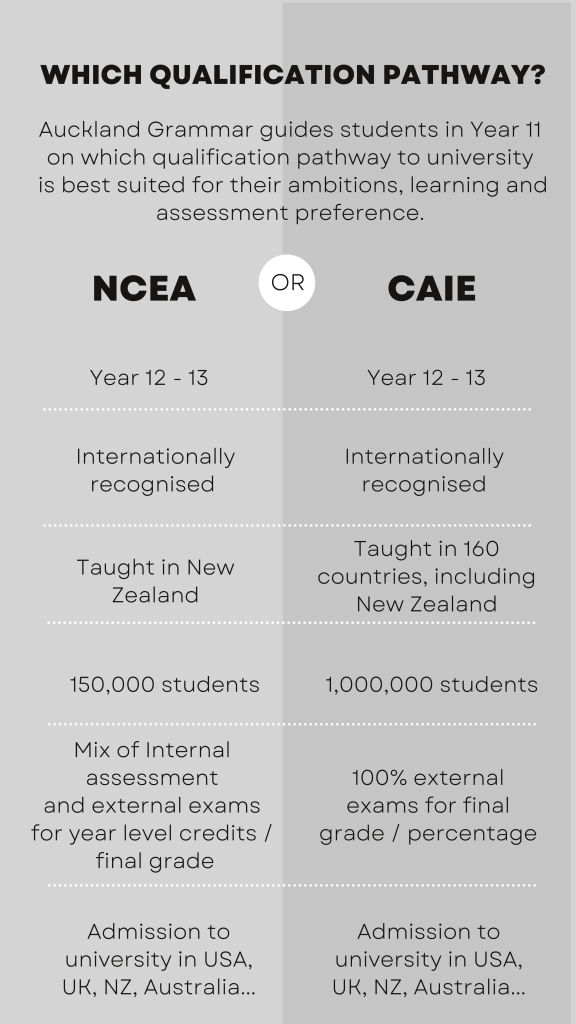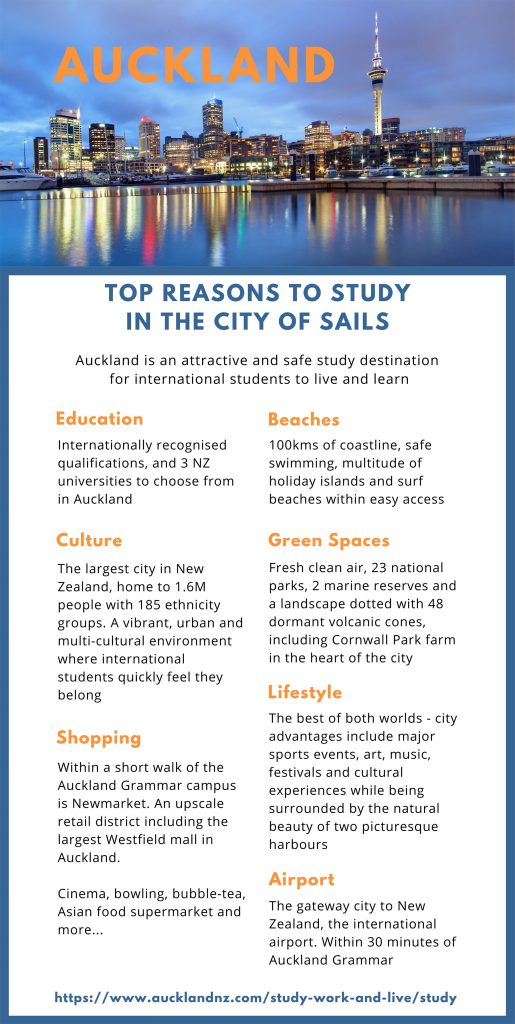Frequently Asked Questions
Auckland Grammar School has been successfully teaching boys for more than 150 years. The School attracts and retains excellent teachers with specialist subject knowledge, and has developed strong systems that support the academic success of students and their all-round personal development.
In addition, the School has many resources and world-class facilities, which provides significant opportunity and advantages to enrolled students. This includes access to more than 100+ sports, music, art, and culture groups and clubs for student enjoyment, building confidence and creating friendships.
- Pass rate of 100% in Cambridge International Exams
- University Entrance pass rates of 90% over the last 20 years
- Annually, Auckland Grammar School is in the top three schools for elite NZQA scholarship exam results
- Entrants in the top 1% of other international exams
- Students compete regularly in international competitions, such as Mathex and International Young Physicists Tournament
Around 25% of Year 13 student leavers seek admission to a top university worldwide. Our graduates enrol at universities in the USA, UK, Australia, Singapore, Japan, Korea and New Zealand.
University admissions include Princeton, Harvard, Yale, Chicago, Auckland, Otago, Massey, Oxford, Manchester, Sydney, Melbourne, Imperial College of London, Seoul National University, Waseda and Kings College London.
Both high school qualifications are internationally recognised for admission to universities worldwide. The main differences are the teaching style, content and assessment. About 60% of Grammar students study the CAIE pathway for university admission.
NCEA is the New Zealand national curriculum governed by the NZ authority NZQA, and CAIE is an international curriculum administered by Cambridge University in the UK.
Take a look at the comparison graphic with some points to consider.

Auckland Grammar School holds a daily assembly to create a sense of pride and belonging amongst the 2600 students and teaching staff. This is a time of celebration and recognition, providing students with aspiration for achieving their own personal goals in academics, sport, competition, culture and art.
At assembly, the daily notices are read and on occasion special guest speakers, musical pieces, singing, drama and cultural performances are included.
It is important to remember, that it is not what form class a student begins at Auckland Grammar, but it is what they can achieve through the benefit of our teaching, environment and resources. Often international students may have lower English proficiency than their peers, however this initial barrier can be quickly overcome with targeted support from teaching staff and student attitude to their learning.
Based on the School’s own research and international peer-review, it has found that organising students into classes based on similar academic ability aids in achieving healthy competition and hence motivation for lifting overall performance. Boys tend to excel in such an environment and their achievements confirm this.
Students are annually assessed and placed into a form class based on their academic results. A student may rise from the middle range to the top of the school based within 1 year. This is called a meritocracy. Hard work and achievement are duly recognised with no favouritism, so everyone has equal opportunity and that is to the benefit of international students too.
Therefore, all students under this system have the opportunity to be first in class and first in subject and be recognised for that achievement, not just students in the upper classes. Each year, we are proud to see our international students reach their best potential within our school whatever their form class may be.
For many years, Auckland Grammar School has welcomed international students from around the world to access the benefits of our education, share their culture, and become part of our diverse student community and alumni network.
The internationalisation goals of the School are to provide opportunity to both local and international students by fostering interconnectivity between all students, including a celebration of cultures through involvement in numerous clubs and festival performances.
This includes general student welfare, housing monitoring and management, and a comprehensive orientation programme. In addition, student groups such as the Headmaster’s Committee International and International Buddy Network provide a layer of peer-to-peer support for student integration, encouragement and friendship.
International students also have access to the English as a Second Language Department (ESOL), Academic monitoring and coaching, Peer Tutors, Guidance and Counselling staff, Health Centre, Careers Advice, and University Application assistance as well as more than 100+ sports, music, art and culture clubs and societies.
